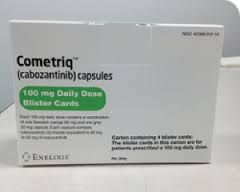|
当前位置:新特药品资料下载首页 >> 新特药品PDF说明书 >> Cometriq(cabozantinib)
Cometriq(cabozantinib)
Pharmacological Class: Active Ingredient(s): Company
Treatment of progressive, metastatic medullary thyroid cancer (MTC). Pharmacology: Cabozantinib inhibits the tyrosine kinase activity of RET, MET, VEGFR-1, -2 and -3, KIT, TRKB, FLT-3, AXL, and TIE-2. These receptor tyrosine kinases are involved in both normal cellular function and pathologic processes such as oncogenesis, metastasis, tumor angiogenesis, and maintenance of the tumor microenvironment. Clinical Trials: The safety and efficacy of Cometriq was assessed in a double-blind, controlled trial of 330 patients. The main efficacy outcome measures were progression-free survival (PFS), objective response (OR), and response duration. A statistically significant prolongation in PFS was demonstrated among Cometriq-treated patients compared to those receiving placebo [HR 0.28 (95% CI: 0.19, 0.40); p <0.0001], with median PFS times of 11.2 months and 4 months in the Cometriq and placebo arms, respectively. Partial responses were observed only among patients in the Cometriq arm (27% vs. 0; p<0.0001). The median duration of objective responses was 14.7 months (95% CI: 11.1, 19.3) for patients treated with Cometriq. There was no statistically significant difference in overall survival between the treatment arms at the planned interim analysis. Legal Classification: Rx Adults: Swallow whole. 140mg daily. Do not eat at least 2 hours before or 1 hour after dose. Continue until disease progression or unacceptable toxicity. Withhold for Grade 4 hematologic adverse reactions, ≥Grade 3 non-hematologic reactions or intolerable Grade 2 reactions. Upon improvement to Grade 1 or to baseline, reduce dose as follows: previously on 140mg daily, resume at 100mg daily; previously on 100mg daily, resume at 60mg daily; previously on 60mg daily, resume at 60mg if tolerated, otherwise discontinue. Concomitant strong CYP3A4 inhibitor: reduce daily dose by 40mg; resume dose used prior to starting inhibitor 2–3 days after discontinuation of inhibitor. Concomitant strong CYP3A4 inducers: increase daily dose by 40mg; resume dose used prior to starting inducer 2–3 days after discontinuation of inducer. Max daily dose: 180mg. Children: Not studied. Warnings/Precautions: Permanently discontinue if the following occurs: GI or non-GI perforation/fistula formation, severe hemorrhage, serious arterial thromboembolic events (eg, MI, cerebral infarction), nephrotic syndrome, malignant hypertension, hypertensive crisis, persistent uncontrolled hypertension despite optimal medical management, osteonecrosis of the jaw, reversible posterior leukoencephalopathy syndrome. Moderate-to-severe hepatic impairment: not recommended. Recent history of hemorrhage, hemoptysis: avoid. Stop treatment at least 28 days prior to scheduled surgery (including invasive dental procedures); withhold dose if dehiscence or wound healing complications require medical intervention. Monitor for bleeding, hypertension, proteinuria (measure urine protein regularly). Use effective contraception during and up to 4 months after completion of therapy. Pregnancy (Cat. D). Nursing mothers: not recommended. Interaction(s) Avoid concomitant strong CYP3A4 inhibitors (eg, ketoconazole, itraconazole, clarithromycin, atazanavir, nefazodone, saquinavir, telithromycin, ritonavir, indinavir, nelfinavir, voriconazole, grapefruit or grapefruit juice) and strong CYP3A4 inducers (eg, dexamethasone, phenytoin, carbamazepine, rifampin, rifabutin, rifapentine, phenobarbital, St. John’s Wort): see Adult dose. Adverse Reaction(s) Diarrhea, stomatitis, palmar-plantar erythrodysesthesia syndrome, decreased weight/appetite, nausea, fatigue, oral pain, hair color changes, dysgeusia, hypertension, abdominal pain, constipation, increased AST, ALT, alkaline phosphatase, lymphopenia, hypocalcemia, neutropenia, thrombocytopenia, hypophosphatemia, hyperbilirubinemia. How Supplied: 140mg daily-dose carton—4 blister cards (each: 7x80mg and 21x20mg caps); 100mg daily-dose carton—4 blister cards (each: 7x80mg and 7x20mg caps); 60mg daily-dose carton—4 blister cards (each: 21x20mg caps) LAST UPDATED: 1/18/2013 治疗转移性甲状腺髓样癌新药获美批准上市
|
最新下载推荐下载
下载排行 |

|
 |
|
| 新特药品资料下载首页 | 药品季度价格表下载 | 新特药品PDF说明书 | 分类 | 专题 | 留言本 | 投稿 | 搜索 |
